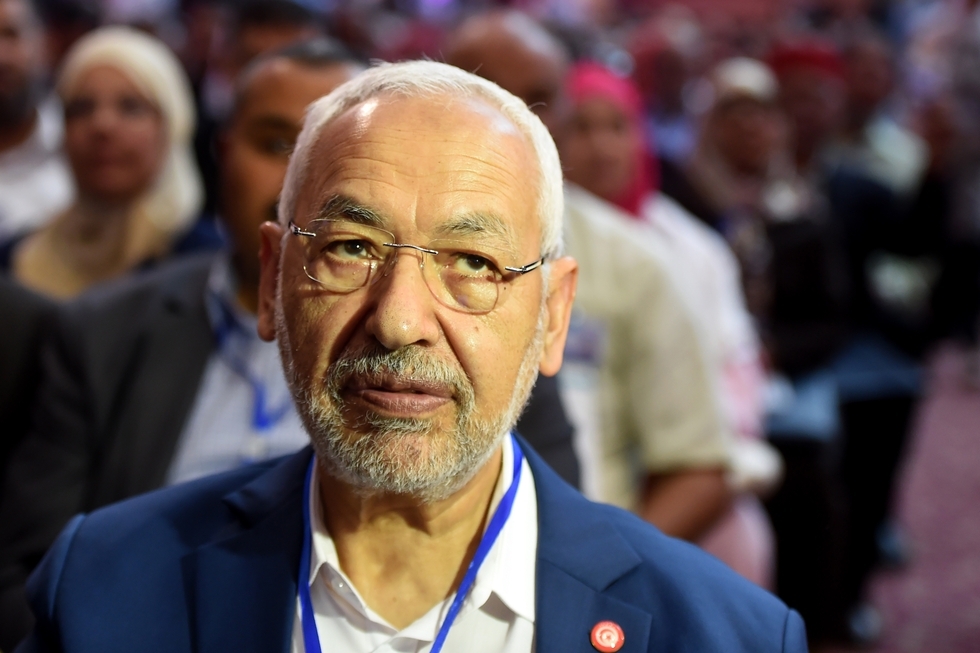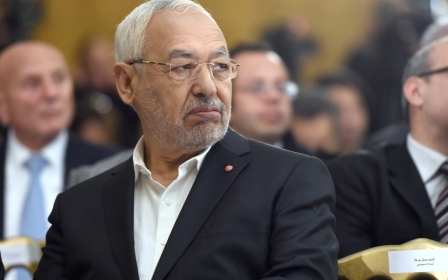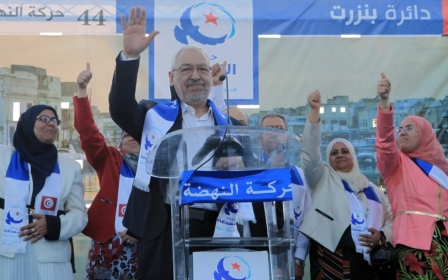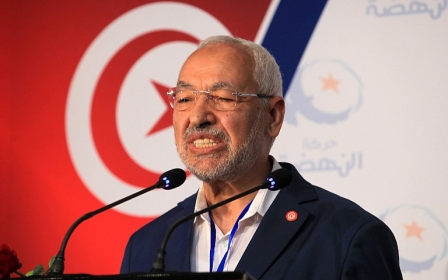Rached Ghannouchi Q&A: Thoughts on democratic Islam

MEE: Ennahda has just taken a historic decision to separate itself from the mosque and to define itself purely as a political project. How do you define what you have done? Is it separation or specialisation?
RG: Its a continuation, not a rupture. Last week in the congress we adopted the idea of a civil party so that we can distinguish between what is sacred in Islam and what can be freely interpreted. The political field is not sacred nor immutable. It's civic, human. It's free for ijtihad or independent human reasoning. More than 90 percent of Islamic texts are open to interpretation and to nuance. We consider few texts as fixed or immutable. Many Muslims confuse the two kinds of texts and consider all texts as sacred and untouchable and only capable of bearing one meaning. The Islamic text concerning politics is open to interpretation, and this is the field in which we now act. We consider ourselves observant Muslims. We believe in Islam, that Islam came to Earth to liberate mankind, and to define the free person.
MEE: How then will Ennahda change?
RG: You have to distinguish between a political institution and a religious one. For example, mosques must not be an arena of confrontation between political parties. Mosques have to unify the Muslim community, not to divide it. We have to avoid any political propaganda within mosques. Politics push people to compete, for wealth, power, and this is what we have to avoid.
MEE: Are you saying that imams should not talk politics?
RG: No they can speak out, but only about the common or national interest. When a country is under occupation, the imam has to urge people to resist, to resist against poverty, against any social disease concerning the community, not about political parties. Some religious preachers are members of our party. Once elected to parliament, they will now have to choose either to be in parliament and stop being an imam, or stay as an imam and not go to parliament.
MEE: Does that apply to you?
RG: Yes.
MEE: Are you going to cease any dawa or proselytising of Islam?
RG: Yes. We have stopped all dawa within the party. We have to ensure those who call people to Islam unify the community not split it, because religion is a matter of unity, not a means of dividing society.
MEE: You were in Britain in 1994 when Tony Blair became the leader of the Labour Party, and I was in the conference chamber in 1994 in Blackpool when he said there would be a new constitution of the Labour party and announced the abolition of Clause 4, which committed the Labour Party to the state ownership of the means of production. This was seen as a constitutional break by New Labour with its past and a statement that they were a new party. Is there a comparison between what you have just done and what Tony Blair did in 1994?
RG: Yes. We would like to promote a new Ennahda, to renew our movement and to put it into the political sphere, outside any involvement with religion. Before the revolution we were hiding in mosques, trade unions, charities, because real political activity was forbidden. But now we can be political actors openly. Why should we play politics in the mosque? We have to do politics openly in the party. We have not misled anyone by using religiosity for political reasons. We have to respond to people’s needs and not mislead them with religious emotions.
MEE: You say that now the revolution is secure, it is no longer Ennahda’s job to protect Islam. The post-revolutionary state does that. But is this state that secure? If the Emiratis had succeed in buying the loyalty of your president, Beji Caid Essebsi - they offered Tunisia $5bn-$10bn - everything you built, the constitution, parliament, elections, would have crumbled.
RG: I have enough confidence in our president. I have confidence in his patriotism and he is elected by the Tunisian people. His authority does not depend on the support of a foreign power. He knows a large section of the Tunisian people elected Ennahda and he needs Ennahda to consolidate his government. We need his party to make a balance, to make a solid base for our state and our government. Power is based on the balance of power. The balance of power in Tunisia needs collaboration between the president, his party and our party. All opinion polls reflect that more than 70 percent of Tunisians are keen to maintain democracy. So it's not easy to stage a coup d’etat against the wishes of this vast majority of Tunisians.
Of course Tunisians protest against official policies, but even among their ranks there is support for the state. Compare what happened in Mosul in 2014 to what happened in Ben Guerdane earlier this year. In Mosul two to three hundred Daesh fighters took over a city of three million, with its own central bank and with huge consequences for Iraq. A similar number of Daesh tried to take over the small border town of Ben Guerdane and they failed because Tunisians are very keen to keep this country a democracy.
MEE: A statue was re-erected to the Tunisian leader who pushed to have you retried in prison and executed. The statue of Habib Bourguiba on a horse was put back in its original place in the Avenue de Bourguiba in Tunis and there was an official ceremony to which the president went.
RG: Yes. Bourguiba is a great personality. You cannot airbrush him out of our history. He guided a national movement which liberated Tunisia. I cannot negate that. It is a reality.
MEE: So you support the re-erection of the statue?
RG: I am not in favour of this statue. When I was in prison Bourguiba wanted to retry me, so that my sentence would be increased from life imprisonment to the death penalty. He wanted to repeat the behaviour of the sultans, but he was deposed within three days. But he has his place in Tunisia’s history. In my speech at the opening ceremony of the party conference, I mentioned a number of national leaders and one of them was Bourguiba.
MEE: Now that you have left Islam, what will be the identity of your party? Why should Tunisians vote for you and not Nidaa Tounes?
RG: We didn’t leave Islam. Islam is our reference point. It’s the inspiration, but we don’t ask people to elect us because we are more religious than others. We would like to attract people to our movement regardless of their religiosity. All Tunisians are able to join our party, if they accept our programme and our programme is not based purely on religion. It's based on giving real services to people, real solutions to solve their daily problems. To provide education, good health-care and create jobs
MEE: Will you be a party of the left or right?
RG: We are in the centre. We believe in a social economy to reconcile the free market with social justice. Similar to the model of the Scandinavian countries.
MEE: You have changed your constitution; would you change the party’s name?
RG: Not yet. It could be called the Conservative Party.
MEE: Then will you need a Shura Council?
RG: Yes, we need a Shura.
MEE: A Shura is for a religious organisation
RG: Our party is democratic. Decision-making in the party is not individual. Decisions are made by institutions. We would like to institutionalise any decision-making concerning the public interest. So we are very keen to fight against any sort of dictatorship, inside the party, or in the wider political system.
MEE: If you won a majority in the next elections in 2019 would you govern alone or would you seek a coalition?
RG: We are still in a transitional democracy, so we need a consensual system. Tunisia is not able to be ruled by one party now, even if this party gained the majority; 51 percent is not enough in this period of transition.
MEE: What signal are you sending the Muslim Brotherhood in Egypt, Yemen, Syria, who do not have a state to protect them, or free elections, to people who are languishing in prison. What is your relationship to the Brotherhood in Egypt?
RG: We advise all Islamists in the region to be more open and to work with others and to look for a consensus with others, because without national unity, without national resistance against dictatorship, freedom cannot be achieved. There needs to be a genuine reconciliation between Islamists and secularists, between Muslim and non-Muslim. Dictatorship feeds off confrontation between all parties. This only leads to chaos and civil war, where no one will be the winner and everyone will be a loser.
MEE: Political Islam exists because of its claim to give an alternative to the choice between dictatorship and Daesh or al-Qaeda. If you now say as an international scholar that political Islam does not exist, what choice are you giving people who do not have a state to protect them?
RG: I am talking about Tunisia. In Tunisia, we don’t need to continue political Islam, because this is a reaction to dictatorship and to severe laicite (secularisation). We don’t want Islam to be an element of confrontation. Islam is now coexisting peacefully with the state. The state, as mentioned in our constitution, protects Islam. And Muslims and our free society protect Islam. So Islam does not need to be protected by one party. But in other countries, perhaps political Islam can play a role against dictatorship. It can be an element to mobilise people against dictators. Why not ?
MEE: Will you still play a role in the International Organisation of the Muslim Brotherhood?
RG: I am not part of any international group. I am only part of the International Union of Muslim Scholars which is a non-political body. I am also part of the European Fatwa Council.
MEE: You are turning your back on political Islam. You describe yourself as a Muslim democrat and Ennahda will become a conventional democratic party on the European model. Are you therefore acknowledging that there is no role for political Islam and does that mean in turn, the Western critique that Islam itself is in need of reformation has some truth in it?
RG: I don’t think that Islam needs a reformation, but the way people understand Islam needs reforming. But Islam itself does not need a reformation.
MEE: But do you think that the era of political Islam is over?
RG: Political Islam is a Western term. It was first used after the collapse of the Ottoman Empire, when Muslims felt that there was a vacuum and that they had to rebuild an Islamic nation. Before that there was a separation between the state and society and each had their role, scholars, rulers, and judges. But when the state began to arrest the ulema ( body of Muslim scholars) the idea emerged that Islam was under threat. In Tunisia, Islam is not under threat, so we do not need political Islam.
MEE: What do you say to those people who accuse you of abandoning them to Daesh, because the salafi jihadists will say: “We and we alone are the true believers.”
RG: One of the reasons that I do not need to belong to political Islam, is that Daesh is part of this political Islam. Daesh is one of the elements within political Islam, so I would like to distinguish myself from Daesh. I am a Muslim democrat and they are against democracy. Daesh considers democracy as haram. There are many deep differences between us and Daesh. Daesh. They are Muslim. I cannot say that they are not. But they are criminals. They are dictators. Daesh is another face of dictatorship. Our revolution is a democratic revolution, and Islamic values are compatible with democracy.
MEE: If you abandon the phrase or the idea of political Islam to Daesh, aren’t you giving them space that they will misuse?
RG: If our project, our interpretation of Islam is a success, there will be no place for Daesh. Daesh could not take any part of Tunisia. They attack London or Paris, but they did not take any place in Tunisia, so we are the real alternative to Daesh, providing a model of democracy that promotes pluralism rights and respects religious freedoms.
MEE: Do you acknowledge you are taking a risk with your party, to compete on purely political grounds. Is not that a risk for you?
RG: Perhaps some people will leave us, but others will join because most of the Tunisian people are moderate. They are very keen to define themselves as Muslim, but they are open minded. Eighty percent of Tunisia is living on the coast. They live facing Europe. So Tunisia cannot be Daesh. This ideology cannot be mobilised in Tunisia. Salafi jihadis cannot constitute a real trend. They are the legacy of Ben Ali, of dictatorship. They are not the product of the revolution. Once democracy prevails and the economy has recovered, I think there will be little attraction to jihadi salafism or even Islamic radicalism.
MEE: Is the West giving you enough support?
RG: Not enough. I think the West gave more support to democracy in Eastern Europe than in Tunisia, even though Tunisia is like a fortress guarding Europe against Daesh. If Daesh takes over Tunisia, Europe will be under real threat, as we see in parts of Libya.
MEE: Are there any circumstances in which you would become president?
RG: Its not in my plans, so far.
MEE: So far. So there are circumstances in which you would become president. Is your project to build a national party which will become the core, the heart of political life in Tunisia?
RG: Yes. I think Ennahda can be the main party in Tunisia. Tunisians are homogenous, very unified, while there is real plurality in thought and culture. There is a large centre ground. Ennahda can represent this centre of ordinary Tunisians within the middle and lower class.
New MEE newsletter: Jerusalem Dispatch
Sign up to get the latest insights and analysis on Israel-Palestine, alongside Turkey Unpacked and other MEE newsletters
Middle East Eye delivers independent and unrivalled coverage and analysis of the Middle East, North Africa and beyond. To learn more about republishing this content and the associated fees, please fill out this form. More about MEE can be found here.




